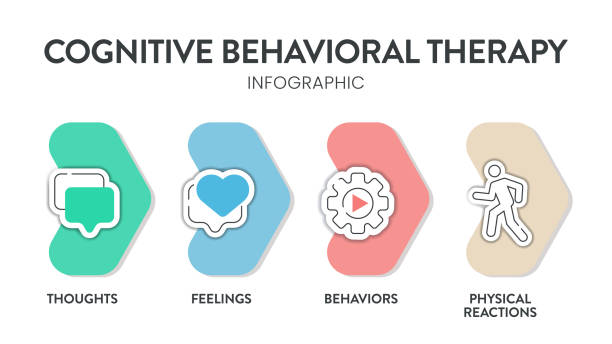Mental health treatment has evolved significantly over the years, and one of the most researched and effective approaches in modern psychology is Cognitive Behavioral Therapy (CBT). Whether addressing anxiety, depression, PTSD, or substance use, Cognitive Behavioral Therapy Techniques have helped millions reframe their thoughts, regulate emotions, and adopt healthier behaviors.
CBT is not just about “thinking positively”—it’s about learning practical strategies to rewire how the brain interprets experiences, reacts to challenges, and creates lasting behavioral change. In this blog, we’ll explore how CBT works, its core techniques, and how it can significantly improve mental health outcomes.
What Is Cognitive Behavioral Therapy (CBT)?
Cognitive Behavioral Therapy is a form of psychotherapy that focuses on identifying and changing negative thought patterns and behaviors. Developed by Dr. Aaron Beck in the 1960s, CBT operates on the principle that our thoughts, feelings, and behaviors are interconnected. If we can shift negative or distorted thinking, we can influence how we feel and behave in daily life.
CBT is a goal-oriented, time-limited therapy commonly used to treat:
- Anxiety disorders
- Depression
- Post-traumatic stress disorder (PTSD)
- Obsessive-compulsive disorder (OCD)
- Substance use disorders
- Eating disorders
- Sleep problems
What makes CBT particularly powerful is its emphasis on building lifelong coping skills, making it one of the most practical forms of therapy today.
Why CBT Works: The Power of Changing Thoughts?
The core philosophy behind CBT is that automatic, negative thought patterns often lead to emotional distress and maladaptive behaviors. For example, a person struggling with social anxiety may constantly think, “People are judging me,” which leads to avoidance of social situations, reinforcing their anxiety.
By helping individuals:
- Identify irrational or unhelpful thoughts
- Challenge the evidence for and against those thoughts
- Replace them with more balanced and rational beliefs
CBT empowers people to gain control over their emotional responses and daily choices.
Core Cognitive Behavioral Therapy Techniques
Let’s break down some of the most widely used and evidence-based CBT techniques that therapists incorporate into treatment:
1. Cognitive Restructuring (Thought Challenging)
Cognitive restructuring helps individuals identify distorted or harmful thinking patterns and replace them with more accurate, positive ones.
Example:
Negative Thought – “I always fail at everything.”
Reframed Thought – “I’ve had some setbacks, but I’ve also succeeded in many areas.”
Clients are taught to evaluate the evidence for their negative thoughts, consider alternative perspectives, and test the reality of their beliefs. Over time, this technique rewires habitual negative thinking.
2. Behavioral Activation
Depression often leads to avoidance and withdrawal, which worsens symptoms. Behavioral activation encourages people to re-engage with positive, value-driven activities—even when they don’t feel like it.
Steps include:
- Scheduling small, manageable tasks
- Monitoring mood before and after activities
- Gradually increasing engagement with life
This technique is especially useful in treating depression and helps restore a sense of purpose and motivation.
3. Exposure Therapy
For anxiety-related disorders like phobias, PTSD, and OCD, exposure therapy helps individuals confront their fears in a controlled and safe environment. Rather than avoiding triggers, they learn to face them gradually and develop tolerance.
Types of Exposure:
- Imaginal exposure – mentally revisiting traumatic memories
- In vivo exposure – confronting real-life situations or objects
- Interoceptive exposure – exposing oneself to feared physical sensations (e.g., rapid heartbeat)
This technique reduces avoidance behavior and re-teaches the brain that feared outcomes are unlikely or manageable.
4. Mindfulness-Based Cognitive Therapy (MBCT)
MBCT combines cognitive techniques with mindfulness practices, such as breathing exercises, body scans, and moment-to-moment awareness. It teaches clients how to observe their thoughts without judgment and avoid getting “hooked” by negative thinking spirals.
Mindfulness-based CBT is particularly effective for:
- Recurrent depression
- Generalized anxiety disorder
- Relapse prevention
5. Journaling and Thought Records
Keeping a thought diary or journal helps individuals track their emotional responses and thought patterns over time. This technique improves self-awareness and highlights cognitive distortions.
Clients may record:
- The situation
- Their automatic thoughts
- Emotions felt
- Alternative responses
- Final outcome
It’s a valuable tool for self-reflection and monitoring progress between therapy sessions.
6. Socratic Questioning
CBT therapists often use Socratic questioning to help clients evaluate their assumptions and beliefs. This structured form of questioning encourages critical thinking and deeper insight.
Questions might include:
- “What is the evidence for this belief?”
- “Is there an alternative explanation?”
- “What would I say to a friend thinking this way?”
This technique is particularly effective in addressing rigid or harmful beliefs related to self-worth, failure, or trauma.
7. Problem-Solving Skills Training
This CBT technique is ideal for clients overwhelmed by life stressors. It involves teaching individuals how to break down complex problems into manageable steps.
The process includes:
- Identifying the problem
- Brainstorming potential solutions
- Evaluating pros and cons
- Selecting a solution and testing it
- Reviewing outcomes and adjusting
It’s a practical method that empowers clients to regain control over daily stressors.
8. Activity Scheduling and Planning
This structured technique helps clients create a balanced daily routine that includes pleasurable, necessary, and mastery-oriented activities. Especially beneficial for those struggling with depression, activity planning restores a sense of accomplishment and structure.
Who Can Benefit from CBT?
While CBT is commonly associated with anxiety and depression, its flexibility and structured nature make it suitable for a wide range of individuals, including:
- Veterans struggling with trauma
- Teens facing academic or social pressure
- Adults navigating relationship issues
- People with addiction disorders
- Individuals with chronic pain or medical conditions
At Lone Star Mental Health, CBT is integrated into customized treatment plans that address the unique needs of each client, combining evidence-based techniques with compassionate care.
Cognitive Distortions to Watch Out For
CBT also teaches clients how to recognize common thinking traps, such as:
- All-or-nothing thinking – “If I’m not perfect, I’m a failure.”
- Overgeneralization – “I failed once, so I’ll always fail.”
- Catastrophizing – “This is the worst thing that could ever happen.”
- Emotional reasoning – “I feel guilty, so I must be guilty.”
- Labeling – “I’m stupid, lazy, or worthless.”
Once these distortions are identified, clients can begin to reframe them using CBT principles.
The Role of the Therapist in CBT
A trained CBT therapist doesn’t just listen; they teach. The therapist acts as a coach, guiding the client through structured exercises, challenging distorted thinking, and helping them implement behavioral strategies outside of sessions.
Sessions are typically short-term (8–20 weeks), and clients are given “homework” between sessions to practice skills, which helps reinforce learning and encourage real-world application.
CBT in Combination with Other Treatments
While CBT is effective on its own, it can also be combined with:
- Medication – particularly SSRIs for depression or anxiety
- Group therapy – to build social skills and gain peer support
- Dialectical Behavior Therapy (DBT) – for emotional regulation
- EMDR or trauma-focused therapy – for severe PTSD
At Lone Star Mental Health, clients may undergo a combination of therapeutic modalities that include CBT to achieve the best outcomes.
Final Thoughts: Empowering Change with CBT
Cognitive Behavioral Therapy Techniques are life-changing tools that help people recognize the power they have over their thoughts, emotions, and actions. With consistent practice and the guidance of a trained therapist, individuals learn how to cope with life’s challenges, build emotional resilience, and create lasting behavioral change.
If you or a loved one is struggling with anxiety, depression, or any mental health challenge, CBT could be the breakthrough you’ve been searching for. At Lone Star Mental Health, our licensed clinicians offer CBT and other proven therapies tailored to your unique needs and goals.



